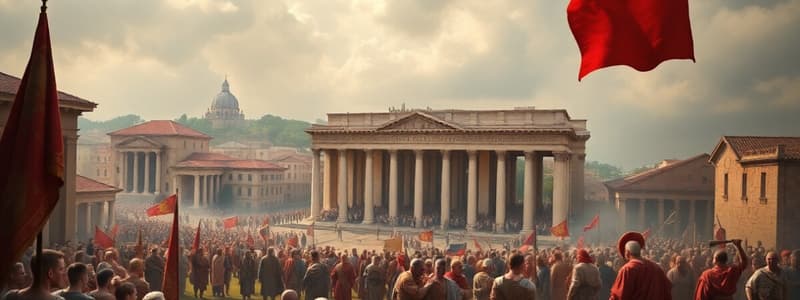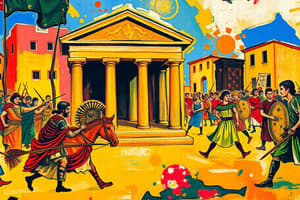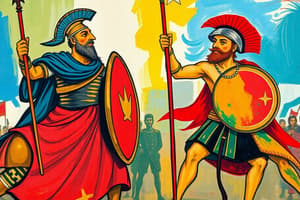Podcast
Questions and Answers
What factors led to the frequent determination of Roman succession through murder or war, aside from the 3rd century?
What factors led to the frequent determination of Roman succession through murder or war, aside from the 3rd century?
The lack of a clear legal framework for succession and intense power struggles among military leaders contributed significantly to this instability.
In what ways did Christianity disrupt the established order of the Roman world?
In what ways did Christianity disrupt the established order of the Roman world?
Christianity introduced new values and beliefs that challenged the traditional Roman polytheism, undermining social cohesion and loyalty to the state.
Why would Augustine evoke tears in Cincinnatus?
Why would Augustine evoke tears in Cincinnatus?
Augustine admired Cincinnatus as a model of virtue and simplicity, contrasting with his own time's perceived moral decay, prompting a deep emotional response.
How did the topography and geography of Italy influence the development of Roman civilization?
How did the topography and geography of Italy influence the development of Roman civilization?
What were the three main groupings of war during the expansion of the Roman Republic?
What were the three main groupings of war during the expansion of the Roman Republic?
Flashcards
Roman Republican Expansion's Impact
Roman Republican Expansion's Impact
Roman expansion, while providing wealth and territory, also fueled internal unrest within the Republic. This was due to factors like the influx of new citizens, the growing power of generals, and economic inequality. Ultimately, these tensions contributed to the decline of the Republic and the rise of the Empire.
Roman Military Innovations of Marius
Roman Military Innovations of Marius
Gaius Marius revolutionized the Roman military by introducing several significant changes. These included professional soldiers replacing citizen-soldiers, a new recruitment system based on merit, and the use of specialized troops like archers and engineers. This transformed the Roman army into a more effective and adaptable fighting force.
Roman Values
Roman Values
Roman society was guided by a set of core values known as pietas (duty to the gods and family), fides (loyalty and trust), gravitas (seriousness and dignity), auctoritas (influence and respect), Romanitas (Roman identity), and mos maiorum (ancestral customs). These values shaped Roman behavior, governance, and social structure.
The Punic Wars
The Punic Wars
Signup and view all the flashcards
Why Did Christianity Disrupt Rome?
Why Did Christianity Disrupt Rome?
Signup and view all the flashcards
Study Notes
Roman Succession and Disruption
- Roman succession was often determined by violence (murder or war) rather than law, even outside the 3rd century.
- Christianity significantly disrupted the Roman world.
- Augustine, a historical figure, might have reacted negatively to Cincinnatus, a Roman figure, given the contrasting historical contexts.
Roman Civilization and Geography
- Topography (landscape) influenced Roman civilization.
- Three main groups of wars during Roman Republic Expansion.
- Marius' military advancements in Rome.
- Challenges in definitively pinpointing the Roman Republic's end are multifaceted.
Roman Civil Unrest and Expansion
- Roman Republican expansion fostered internal conflict.
- Multiple issues, people, and events contributed to the unrest.
Aegean Rise to Prominence
- Two areas of the Aegean Sea were previously considered uncivilized, achieving prominence in the 4th century BCE.
- These previously uncivilized areas rose in prominence by the 4th century BC.
- Alexander the Great's death resulted in kingdoms.
- The Peloponnesian War influenced Athenian art and literature.
Spartan Society and Helots
- Helots became part of Spartan society.
- Darius attacked the Greeks for reasons needing further clarification.
- The Persian Empire, ruled by Darius, Cyrus, and Xerxes.
Spartan and Athenian Governments
- Governments of Sparta and Athens differed in specific ways needing further clarification.
Historical Topics
- Rome and Christianity
- Fall of Rome
- Maccabean Revolt
- General Roman information: military strategies, values, and culture.
- Punic Wars
Studying That Suits You
Use AI to generate personalized quizzes and flashcards to suit your learning preferences.




